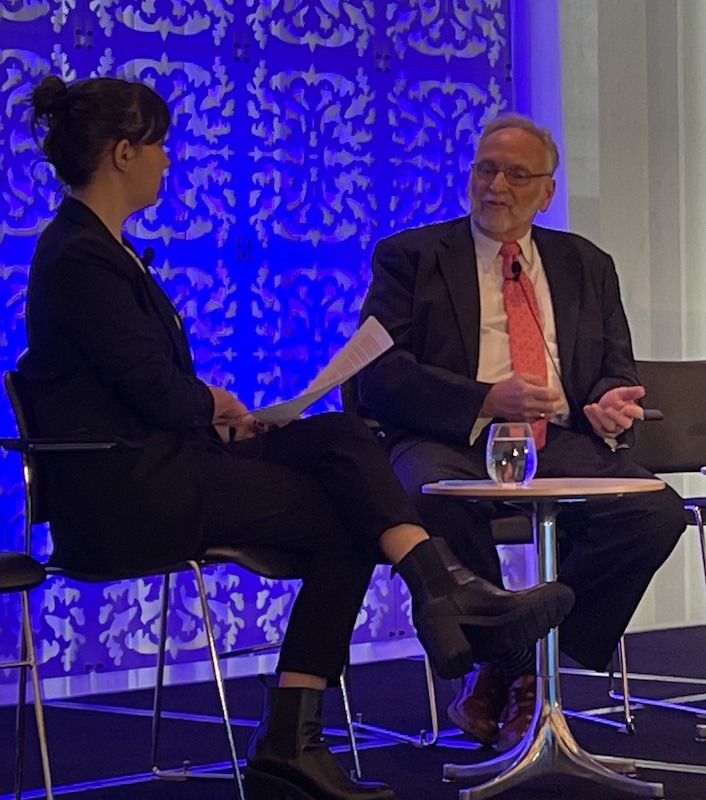
“We support all forms of competition,” chair says
By Amanda OYE
OTTAWA – As he approaches the end of his term as CRTC chair, Ian Scott (above, right) is brimming with confidence – confidence in the Commission’s recent decisions, in its reputation and in its ability to take on more responsibility.
Speaking during a keynote interview with National Post reporter Anja Karadeglija at the International Institute of Communications Canada’s annual conference being held in Ottawa, Scott listed the Commission’s accomplishments during his time as chair, which is coming to an end.
He noted how hard everyone at the Commission has worked during the pandemic. “We really never took the foot off the gas,” he said. “So, my compliments to the institution and all its personnel.”
Scott also included the CRTC’s new wireless framework on his list of accomplishments, while at the same time admitting “not everybody loves it.”
The CRTC spent over a year and a half developing an exhaustive record and weighing expert advice, he explain. “And we produced a framework that is having the desired outcome – rates are going down,” he said, later noting the government’s target for reducing wireless prices was met.
Scott acknowledged prices still need to go down further and argued competition is what will drive them down.
“And the framework that we introduced and are implementing as quickly as possible, I’m confident will continue to drive those rates down and will intensify competition in the wireless space,” he said.
On the matter of the CRTC’s recent wholesale rates decision, which reversed a 2019 decision the Commission made, Scott said (as he has before) the Commission made a mistake. “Once you make that determination, the right thing to do obviously is to correct that mistake.”
Today, the CRTC chair added that, despite public commentary on the matter, “we support all forms of competition.”
That meeting
Now, it would not be a conversation with Ian Scott in 2022 without a question or two about his meeting for beers with Bell executive Mirko Bibic in 2019.
Asked about the attention the meeting has been getting, Scott said it is “misplaced”.
“It’s unfortunate that so much is attached to the title of the chair – I don’t make decisions for the Commission,” he said, noting over 80 professionals give them advice on the telecom side, which they take seriously. “So, the focus is a bit misplaced,” Scott said.
The CRTC chair previously told the Standing Committee on Industry and Technology the same thing, to which Liberal MP Nathaniel Erskine-Smith, responded: “If I were the chair of an organization, I might not cast it in that way. I might take responsibility for the organization that I chair.” (Scott was grilled at that meeting about the Commission’s MVNO and wholesale rates decisions as well – you can read Cartt.ca’s coverage of it here.)
Bill C-11
Despite the controversy caused by the now infamous meeting with Bibic, Scott defended the CRTC as an organization, saying “the Commission’s reputation is sound,” and noting he has full confidence in it.
He further pushed back on critics who say the CRTC should not be tasked with taking on new responsibilities under the recently announced Bill C-11 and Bill C-18, arguing it is untrue the Commission cannot handle the new roles.
On C-11, Scott said one of the criticisms is the Commission is not knowledgeable enough. “It’s perplexing,” he said, pointing out the Commission has been regulating broadcasting for over 50 years. The source of the content does not matter, he said while also noting they will need more resources, which the government plans to provide.
Scott also addressed concerns about the Commission regulating user-generated content. “It is not the focus of the legislation, and more importantly, it’s not the focus of the CRTC,” he said, adding doing so would not contribute to Canada’s broadcasting system and “would not be in the public interest.”
As you can read about here, later in the day, YouTube Canada’s head of government affairs and public policy had a different perspective on user-generated content under the bill.


